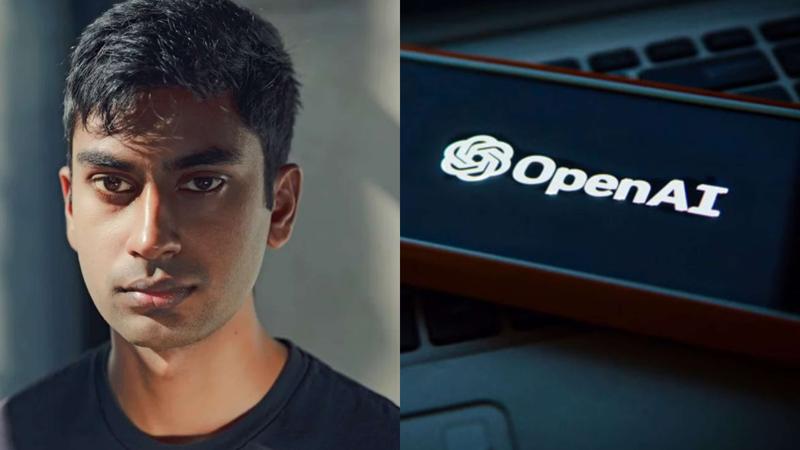‘Heartbroken by His Passing’: OpenAI Breaks Silence on Whistleblower Suchir Balaji’s Death Amid Murder Claims- wna24
[ad_1]

‘Heartbroken by His Passing’: OpenAI Breaks Silence on Whistleblower Suchir Balaji’s Death Amid Murder Claims | Image:
X
Washington: ChatGPT developer OpenAI broke silence on the death case of whistleblower Suchir Balaji. In its first reaction, expressing grief, the tech giant said, “Suchir was a valued member of our team and we are still heartbroken by his passing. We continue to feel his loss deeply.”
“We’ve reached out to the San Francisco Police Department and have offered our assistance if it’s needed. Law enforcement are the right authorities in this situation, and we trust them to continue sharing updates as needed. Out of respect, we won’t be commenting further,” it added.
This comes a day after Suchir Balaji’s mother in an interview with political analyst Tucker Carlson claimed that her son’s death is not a suicide case but a murder.
‘He Had Documents.. They Killed Him’: Suchir Mother’s Big Charges
In the interview with Carlson, Suchir’s mother, Poornima, made some big claims and charges over her son’s death case and the secrecy in the world of AI.
When asked about how she feels if her son has killed himself, recalling the time when the San Francisco medics declared that her son died by suicide, Poornima said, “My son celebrated his birthday a day before he died. What more do we need to give on account that he was in a happy mood?” adding that he even received birthday gift from his father the same day he was later found dead.
Making a grave allegation against OpenAI, Poornima said, “My son had documents against OpenAI. They attacked him and killed him,” adding that “some documents were missing” after his death.
Poornima also accused the ChatGPT maker of hushing up the probe and any possible witnesses, saying “Everybody is suppressed, nobody is ready to come up and tell the truth. Even the attorneys have been made to say that it is a suicide.”
Continuing her verbal attack against OpenAI, Suchir Balaji accused the authorities over the investigation, Poornima also said, “It took them (authorities) more than 14 minutes to determine the cause of death and tell me that it was a suicide.”
“I knew that my son was dead by looking at the white van. In the evening, they returned the keys to me and told me that I could pick up the body tomorrow.”
Who was Suchir Balaji?
Suchir Balaji, a 26-year-old Indian-American tech researcher who openly criticized the use of copyrighted data in artificial intelligence (AI), was found dead in his San Francisco apartment. He joined OpenAI in 2019 and during his four years at the company, he worked on several projects, including GPT-4 training and improving ChatGPT’s performance. He left OpenAI in August this year, expressing concerns over the potential harm OpenAI could cause. During his tenure, he played a significant role in data collection for OpenAI’s flagship product, ChatGPT.
On his website, Balaji elaborated on his concerns, claiming that OpenAI’s method of copying data for training its models potentially amounted to copyright infringement. He touched on issues like the ethical risks of generative AI and potential copyright violations, which have ignited a broader debate within the tech industry and beyond.
Just a day before his death, Balaji’s name was mentioned in a copyright lawsuit against OpenAI. Though details about his involvement remain unclear, his public criticism of the company’s data usage practices likely drew attention to his stance on ethical AI development. Suchir Balaji had accused OpenAI of training its AI models on copyrighted material scraped from the internet without proper authorization, a practice he argued was detrimental. “If you believe what I believe, you have to just leave the company,” Balaji said in an interview with The New York Times earlier this year. The Indian-origin tech professional resigned from OpenAI in October 2023 after nearly four years with the company.
Balaji was outspoken about what he called OpenAI’s misuse of copyrighted materials to train generative AI models. In October, he posted on X (formerly Twitter), “Fair use seems like a pretty implausible defense for a lot of generative AI products, for the basic reason that they can create substitutes that compete with the data they’re trained on.” He also criticized the company’s reliance on ‘fair use’ as a defense, arguing in a blog post cited by the Chicago Tribune that the training of AI systems like ChatGPT raised significant legal and ethical concerns. “No known factors seem to weigh in favor of ChatGPT being a fair use of its training data,” he wrote.
[ad_2]
Source link
